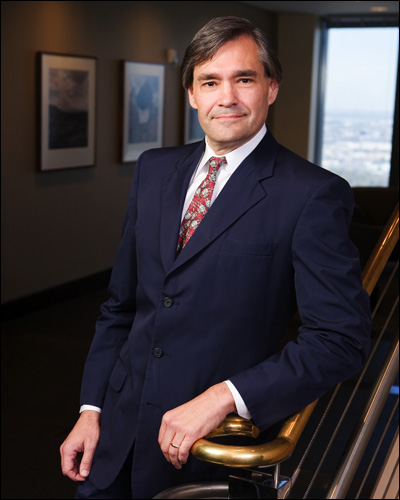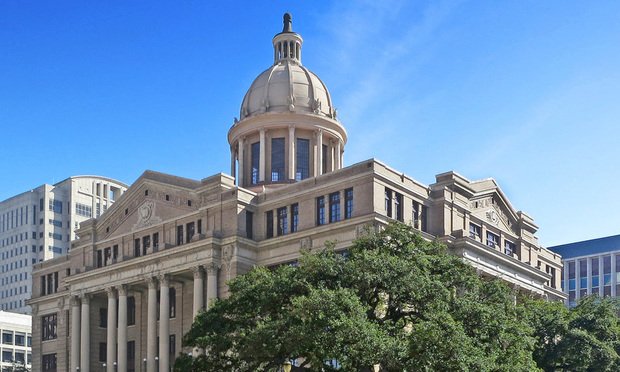
Bar Admissions
State Bar of Texas
U.S. Supreme Court
U.S. Court of Appeals for
the Fifth Circuit
U.S. District Courts:
Eastern District of Texas
Northern District of Texas
Southern District of Texas
Western District of Texas
Memberships & Associations
Board Certified in Civil Appellate Law, Texas Board of Legal Specialization
Houston Bar Association
Born in New Orleans, Louisiana, Ray is long-time resident of the greater Houston area. After graduating from Westbury High School, Ray attended the University of Houston on a track scholarship, where he earned both a Bachelor of Arts degree and a Master of Arts degree in History. He then worked as a track coach and history teacher in Texas public schools.
Ray returned to University of Houston to attend law school, where he distinguished himself as a legal writer as an editor on the Houston Law Review. He received a Doctor of Jurisprudence degree, magna cum laude, in 1987. During law school, he served as a judicial intern for Norman W. Black, Judge of the United States District Court for the Southern District of Texas.
Ray was admitted to the Texas State Bar in May of 1988. In his first year of practice, Ray served as a law clerk for Jerry E. Smith, Judge of the U.S. Fifth Circuit Court of Appeals. Since that time, Ray has worked for over three decades as a civil litigator on the trial and appellate court levels.
A certified specialist in Civil Appellate Law by the Texas Board of Legal Specialization, Ray has handled over one-hundred appeals in the Texas and federal appeals courts. He has presented successful appellate arguments in landmark cases addressing issues of employment law, sovereign immunity, public official immunity, and constitutional rights. Ray has been recognized since 2013 by Best Lawyers of America, a peer-review group as one of Texas’s best lawyers in municipal law.
In recent years, Ray has served as an adjunct professor of law at the University of Houston Law Center, teaching federal administrative law and federal courts. He is frequently invited to speak on various topics at continuing legal education seminars hosted by the Texas State Bar.
Education
University of Houston Law Center, J.D., magna cum laude, 1987
Houston Law Review, Associate Editor
Order of the Coif
University of Houston, B.A. (1977), M.A. (1981)
Professional Legal Experience
Viada & Strayer Law Firm (July 1, 2008 to present)
Abrams Scott & Bickley, L.L.P. (1994 to June 30, 2008)
Sewell & Riggs, P.C. (1989-93)
Adjunct Professor of Law, University of Houston Law Center, Administrative Law (Spring 2015), Federal Courts (Spring 2016)
Texas Board of Legal Specialization (since 1997)
Law Clerk to Hon. Jerry E. Smith, U.S. Court of Appeals for the Fifth Circuit (1988)
Judicial Intern to Hon. Norman W. Black, U.S. District Court, Southern District of Texas (1987)
Publications and Major Speaking Engagements
- Jurisdictional Challenges on Non-Immunity Grounds, Texas Municipal League Intergovernmental Risk Pool Attorney Workshop (2016)
- Derivative Immunity, State Bar of Texas MCLE Course on Suing & Defending Governmental Entities (2013)
- Drafting the Contract with an Eye to Litigation, State Bar of Texas MCLE Course on Suing & Defending Governmental Entities (2012)
- Derivative Immunity, Texas Municipal League Intergovernmental Risk Pool Attorney Workshop (2012)
- Contract Update: Recent Developments, State Bar of Texas MCLE Course on Suing & Defending Governmental Entities (2011)
- Use of Separation of Powers Doctrine, State Bar of Texas MCLE Course on Suing & Defending Governmental Entities (2010)
- Recent Case Development in Breach of Contract Cases, State Bar of Texas MCLE Course on Suing & Defending Governmental Entities (2009)
- Breach of Contract Claims Against Governmental Entities, State Bar of Texas MCLE Course on Suing & Defending Governmental Entities (2008)
- Breach of Contract Claims Against Governmental Entities, State Bar of Texas MCLE Course on Suing & Defending Governmental Entities (2007)
- Conflicts of Interest and Joint Representation, State Bar of Texas MCLE Course on Suing & Defending Governmental Entities (2006)
- Note, Jeanes v. Henderson: The Res Judicata Effect of Prior Federal Judgments on Omitted Pendent State Related Claims, 23 HOUS. L. REV. 1295 (1986)
Major Litigation
- Pearson v. Callahan, 555 U.S. 223 (2009) (overruling Saucier v. Katz’s rigid two-step “order of battle” for deciding qualified immunity and conferring discretion on lower courts to decide the order in which immunity issues are addressed) (representing Texas Association of School Boards as friend of the court).
- Alvarez v. City of Brownsville, 579 F.3d 354 (5th Cir. 2018) (en banc) (reversing $2.3 million judgment and rendering take nothing judgment for city, holding that Brady v. Maryland disclosures not required prior to guilty plea).
- Harris County v. Annab, 547 S.W.3d 609 (Tex. 2018) (clarifying “use of property” requirement of Section 101.021(2) of the Tort Claims Act) (representing Texas Municipal League as friend of the court).
- City of Magnolia 4A Economic Dev. Co. v. Smedley, 533 S.W.3d 297 (Tex. 2017) (20-day clock for interlocutory appeals is reset with each successive jurisdictional challenge that raises new grounds for dismissal).
- City of Watauga v. Gordon, 434 S.W.3d 586 (Tex. 2014) (handcuffing injuries unintentionally caused during arrest are intentional torts within the meaning of intentional tort exemption of the Tort Claims Act, Sec. 101.057(2)) (representing Texas Municipal League and Texas Association of Counties as friend of the court).
- City of Austin v. Whittington, 384 S.W.3d 766 (Tex. 2012) (addressing separation of powers implications in determining the applicability of affirmative defenses to a city’s exercise of eminent domain) (representing Clear Lake City Water Authority as friend of the court).
- City of Waco v. Kirwan, 298 S.W.3d 618 (Tex. 2009) (cities owe no duty under the Recreational Use Statute to warn of naturally occurring dangers in city parks) (representing Texas Municipal League as friend of the court).
- City of Galveston v. State, 217 S.W.3d 466 (Tex. 2007) (immunity of Texas local governmental entities from suit brought by the State of Texas).
- Montgomery County v. Park, 246 S.W.3d 610 (Tex. 2007) (adopting modified Burlington standard defining “adverse personnel action” in Texas Whistleblower Act cases) (representing Texas Association of School Boards as friend of the court).
- 1717 Bissonnet, L.L.C. v. Loughhead, 500 S.W.3d 488 (Tex. App.—Houston [14th Dist.] 2016, no pet.) (damages not recoverable for prospective nuisance).
- City of Oak Ridge North v. Mendes, 339 S.W.3d 222 (Tex. App.—Beaumont 2011, no pet.) (governmental immunity bars claims for violation of the Texas Wiretap Statute, TEX. CIV. PRAC. & REM. CODE Chap. 123).
- Cypress Forest Pub. Util. Dist. v. Kleinwood Mun. Util. Dist., 309 S.W.3d 667 (Tex. App.—Houston [14th Dist.] 2010, no pet.) (contract rights are not “property” within the meaning Art. I, Sec. 17 of the Texas Constitution).
- Clear Lake City Water Auth. v. Salazar, 781 S.W.2d 347 (Tex. App.–Houston [14th Dist.] 1989, orig. proceeding [leave denied]) (local legislators are privileged to resist judicial intrusion 2 into legislative motives).
- Colson v. Grohman, 174 F.3d 498 (5th Cir. 1999) (First Amendment does not protect a politician from politically-motivated defamation).
- City of Galveston v. Gray, 93 S.W.3d 287 (Tex. App.–Houston [14th Dist.] 2002, pet. denied) (mandamus vindicating governmental immunity from merits discovery in advance of a ruling on a plea to the jurisdiction).
- Gaines v. Davis, 928 F.2d 705 (5th Cir. 1991) (recognizes the right of an official to pursue an interlocutory appeal of a discovery order that violates the doctrine of qualified immunity from suit).
- City of Fort Worth v. Zimlich, 99 S.W.3d 62 (Tex. 2000) (establishing legal standard for imputing discriminatory intent to a governmental entity under the Texas Whistleblower Act) (representing Texas Association of School Boards as friend of the court).
